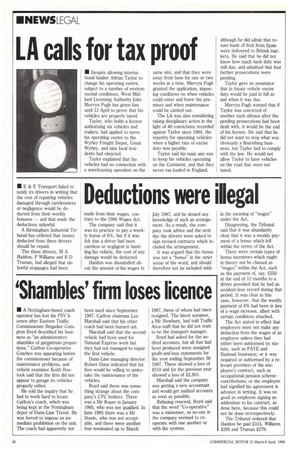Deductions were illegal
Page 28

If you've noticed an error in this article please click here to report it so we can fix it.
• E & E Transport failed to notify its drivers in writing that the cost of repairing vehicles damaged through carelessness or negligence would be deducted from their weekly bonuses — and that made the deductions unlawful.
A Birmingham Industrial Tribunal has ordered that money deducted from three drivers should be repaid.
The three drivers, M A Haddon, P Williams and R D Truman, had alleged that unlawful stoppages had been made from their wages, contrary to the 1986 Wages Act.
The company said that it was its practice to pay a weekly bonus of 6%, but if it was felt that a driver had been careless or negligent in handling his vehicle, the cost of any damage would be deducted.
Haddon was dissatisfied about the amount of his wages in July 1987, and he denied any knowledge of such an arrangement. As a result, the company took advice and the next day the drivers were asked to sign revised contracts which included the arrangement.
It was argued that the bonus was not a "bonus" in the strict sense of the word, and should therefore not be included with in the meaning of "wages" under the Act.
Disagreeing, the Tribunal said that it was abundantly clear that it was a weekly payment of a bonus which fell within the terms of the Act.
There were certain types of bonus incentives which might in theory not be classed as "wages" within the Act, such as the payment of, say, £250 at the end of 12 months to a driver provided that he had an accident-free record during that period. It was clear in this case, however, that the weekly payment of 6% had been in lieu of a wage increase, albeit with certain conditions attached.
The Act stated in effect that employers must not make any deduction from the wages of an employee unless they had either been authorised by statute, such as PAYE and National Insurance; or it was required or authorised by a relevant provision of the employee's contract, such as occupational pension scheme contributions; or the employee had signified his agreement in advance in writing. It was no good an employee signing an addendum to his contract, as done here, because this could not be done retrospectively.
The Tribunal ordered that Haddon be paid £314, Williams £295 and Truman £279.
















































































































































